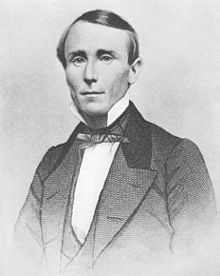Filibuster (military)

A filibuster or freebooter, in the context of foreign policy, is someone who engages in an unauthorized military expedition into a foreign country to foment or support a revolution. The term is usually used to describe United States citizens who attempted to foment insurrections in Latin America in the mid-19th century, but is also applicable in the modern day.
Filibusters are irregular soldiers who act without authority from their own government, and are generally motivated by financial gain, political ideology, or the thrill of adventure. The freewheeling actions of the filibusters of the 1850s led to the name being applied figuratively to the political act of filibustering in the United States Congress.[1]
Unlike a mercenary, a filibuster leader/commander works for himself, whilst a mercenary leader works for others.[2]
History
The English term "filibuster" derives from the Spanish filibustero, itself deriving originally from the Dutch vrijbuiter, "privateer, pirate, robber" (also the root of English "freebooter"[3]). The Spanish form entered the English language in the 1850s, as applied to military adventurers from the United States then operating in Central America and the Spanish West Indies.[4]
The Spanish term was first applied to persons raiding Spanish colonies and ships in the West Indies, the most famous of whom was Sir Francis Drake with his 1573 raid on Nombre de Dios. With the end of the era of Caribbean piracy in the early 18th century the term fell out of general currency.[citation needed]
The term filibuster was revived in the mid-19th century to describe the actions of adventurers who tried to take control of various Caribbean, Mexican, and Central-American territories by force of arms. In Sonora, there were the French Marquis Charles de Pindray and Count Gaston de Raousset-Boulbon and the Americans Joseph C. Morehead and Henry Alexander Crabb. The three most prominent filibusters of that era were Narciso López and John Quitman in Cuba and William Walker in Baja California, Sonora, and lastly Nicaragua. The term first returned to American parlance when used to refer to the Cuban expeditions of Narciso Lopez in 1851.[5][6]
Several Americans were involved in freelance military schemes, including William Blount (West Florida), Augustus W. Magee (Texas), George Mathews (East Florida), George Rogers Clark (Louisiana and Mississippi), William S. Smith (Venezuela), Ira Allen (Canada), William Walker (Mexico and Nicaragua), William A. Chanler (Cuba and Venezuela), and James Long (Texas).[5] Gregor MacGregor was a Scottish filibuster in Florida, Central and South America.
Although the American public often enjoyed reading about the thrilling adventures of filibusters, American citizens involved in filibustering expeditions were usually in violation of the Neutrality Act of 1794 that made it illegal for an American to wage war against another country at peace with the United States. For example, the journalist John L. O'Sullivan, who coined the related phrase "Manifest Destiny", was put on trial for raising money for Lopez's failed filibustering expedition in Cuba.
In the 1850s, William Walker attempted a filibustering campaign with a strategy involving his leading a private mercenary army. In 1853, he successfully established a short lived republic in the Mexican states of Sonora and Baja California. Later, when a path through Lake Nicaragua was being considered as the possible site of a canal through Central America, he was hired as a mercenary by one of the factions in a civil war in Nicaragua. In 1856 he declared himself commander of the country's army and soon after President of the Republic. After attempting to take control of the rest of Central America and receiving no support from the U.S. government, he was defeated by the four other Central American nations he tried to invade and eventually executed by the local Honduran authorities he tried to overthrow.
Many Confederate Army officers and soldiers such as Chatham Roberdeau Wheat of the Louisiana Tigers obtained valuable military experience from filibuster expeditions. The author Horace Bell served as a major with Walker in Nicaragua in 1856. The notorious Col. Parker H. French served as Minister of Hacienda and was appointed as Minister Plenipotentiary to Washington in 1855.
As part of a proposed 1962 CIA Operation Northwoods to discredit the Fidel Castro regime and provide justification for overt United States military operations against Cuba, one of the suggestions was to simulate a "'Cuban-based' 'Castro-supported' filibuster" against a neighboring Caribbean nation.[7]
See also
- Aaron Burr
- Hunters' Lodges
- Knights of the Golden Circle
- Mercenary
- Neutrality Act of 1794 (US)
- Foreign Enlistment Act 1819 (UK)
- Foreign Enlistment Act 1870 (UK)
Notes
- ^ William Safire, Safire's New Political Dictionary (2008) pp 244
- ^ Axelrod, Alan Mercenaries: A Guide to Private Armies and Private Military Companies CQ Press, 9 Jan 2014
- ^ Oxford English Dictionary, "freebooter". Retrieved 2012-10-26.
- ^ Oxford English Dictionary, "filibuster". Retrieved 2012-10-26.
- ^ a b Manifest Destiny's Underworld: Filibustering in Antebellum America, by Robert E. May. Chapter 1
- ^ filibuster - Definitions from Dictionary.com
- ^ http://www.gwu.edu/~nsarchiv/news/20010430/northwoods.pdf
References
- Brown, Charles H. Agents of Manifest Destiny: The Lives and Times of the Filibusters. University of North Carolina Press, 1980. ISBN 0-8078-1361-3.
- Lipski, John M. "Filibustero: origin and development." Journal of Hispanic Philology 6, pp. 213–238
- May, Robert E. "Manifest Destiny's Filibusters" in Sam W. Haynes and Christopher Morris, eds. Manifest Destiny and Empire: American Antebellum Expansionism. College Station, Texas: Texas A&M University Press, 1997. ISBN 0-89096-756-3.
- May, Robert E. Manifest Destiny's Underworld: Filibustering in Antebellum America. University of North Carolina Press, 2002. ISBN 0-8078-2703-7.
- Roche, James Jeffrey. The story of the Filibusters. T. F. Unwin, 1891.
- Schreckengost, Gary. The First Louisiana Special Battalion: Wheat's Tigers in the Civil War. Jefferson, N.C.: McFarland and Company, Inc., Publishers, 2008. ISBN978-0-7864-3202-8.
External links
- Texas A & M Univ. on filibustering
- Latin American studies on the Cuban Filibuster Movement (1849-1856)
- the memory palace podcast episode about filibuster, William Walker.
- . Collier's New Encyclopedia. 1921.

